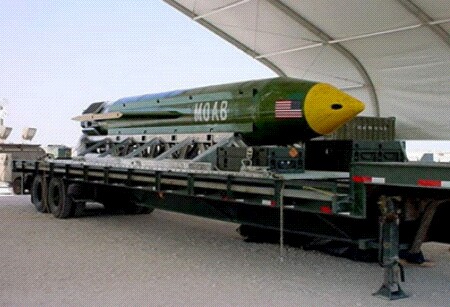FILE PHOTO: Undated file image courtesy the US Air Force shows the GBU-43/B Massive Ordnance Air Blast (MOAB) bomb sitting in an undisclosed location in theater of the Global War on Terror waiting to be used.
The United States President Donald Trump a fortnight ago decertified the Iranian Nuclear Accord entered into in Vienna, Austria in July 2015. The deal limited Iran’s capacity to civilian nuclear programme for power and medical purposes. The United States was empowered to watch over Iran with the US President required to certify that Iran complied with the agreement every 90 days. It was to be subjected to regular checks by international inspectors to ensure no perverse activities took place. The US military on April 13, 2017 dropped what is considered to be the largest non-nuclear bomb on an Islamic State complex in Afghanistan, the Pentagon said. The GBU-43/B Massive Ordnance Air Blast bomb hit a “tunnel complex” in Achin district in Nangarhar province, US Forces Afghanistan said in a statement. / AFP PHOTO / US AIR FORCE / Handout / RESTRICTED TO EDITORIAL USE – MANDATORY CREDIT “AFP PHOTO The controversy is similar to that of reclusive North Korea; situation analysts are predicting a bleak future for Iran that may face another economic sanction. Economic sanctions were imposed on Iran over disagreements with the International Atomic Energy Agency, IAEA on uranium enrichment (acquiring nuclear weapon). Negotiations between Iran and the American led coalition of the Permanent members of the Security Council P5 +1 (the US, UK, Russia, France and China plus Germany) led to the Joint Comprehensive Plan of Action, JCPOA otherwise known as the Iranian Nuclear Accord that came in to force in October 2015. It should be underscored that President Trump who had been critical of the Iran deal early this year, certified to Congress that Iran was technically compliant with the nuclear deal and can continue to enjoy nuclear sanctions relief. It is not clear whether the deal between Iran and world powers strictly prohibits Iran from developing missiles. President Trump’s had criticized the United States and other world powers that struck the Iranian deal under which Tehran agreed to restrict its nuclear programme in return for relief from economic sanctions. According to Trump, the Obama administration allowed over $1.5 billion of blocked reserves to be transferred to Iran and used for military expansion and international armed conflicts in Syria, Iraq and Yemen. His reason for Iran’s nuclear deal decertification was that Iran is violating the spirit of the deal. This attempt at imposition of full economic sanctions on Iran would block access to international trade and finance including billions of dollars in oil revenue and assets. Congress has 60 days to decide whether to re impose sanctions waived under the deal. In the September ding dong affair Trump told the United Nations General Assembly in New York that Iran was building its ballistic missile programme. Iranian President Hassan Rouhani’s response was that the Trump administration was seeking an excuse to pull out of the 2015 nuclear agreement that capped Iran’s nuclear activities in return for the lifting of international sanctions on Iran. Iran’s state media reported a successful test of a new ballistic missile that can carry multiple warheads and can travel up to 2,000 km. Iran’s major uranium enrichment development programme was allegedly concealed for many years but Iran said that the Bushehr reactor allegedly freed up about 1.6 million tonnes of oil (11 million barrels) or 1800 million cubic metres of gas per year and saved some $2 billion per year in oil and gas. Will sanctions really work? The President of Facts Global Energy, FGE consultancy Jeff Brown, in a recent Reuters Global Commodities Summit, said the United States can do it alone with all effectiveness. According to Brown, the United States in the last sanctions cut off about one million barrels per day of crude oil supplies and most of Iranian oil trade finance. Experts say Trump’s decertification may not affect Iran’s current oil exploration and production levels but future investments. Fresh sanctions will have a negative effect on oil markets, international investors, operators, new technologies, spare parts, and service providers will be reluctant to discuss or implement projects with Iran. Some analysts are of the view that reintroducing sanctions will have limited impact because other nations involved may not comply with the American sanctions. The majority of European countries still supports the JCPOA and also wants to protect the multibillion-dollar oil deals between European companies and Iranians. IOCs including Shell (Netherlands), Rosneft (Russia), ENI (Italy) have been shortlisted to join Total (France) that has been in bed with Iran in a development agreement for South Pars offshore gas field. The United States Secretary of State Rex Tillerson has assured the EU that businesses between Iran and European companies would not be affected. What the future holds for Iran and its oil still dangles in the balance. Iran is the second largest producer of crude in OPEC after Saudi Arabia. Most investments may be put on ice or reassessed. That Iran’s missile programme is capable of reaching Israel and Saudi Arabia; two allies of the United States means military confrontation may not be ruled out. If this happens, oil prices may spike to unreasonable levels? The current price level of oil in the fifty dollar range was recovered by OPEC last year in the production freeze. The United States shale oil ignited the great crash of 2014. One hopes Trump is not making Iran a wild card.
